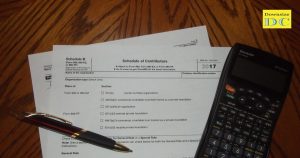What will Attorneys General do with private lists of large donors to groups they hate? Retweet
Sometimes we ask you for funds to file an amicus brief. But not always. We also participate in legal briefs through the dues we pay to other organizations we support, such as the Free Speech Coalition. We want to report on one of those briefs here because it’s very important.
The case is IFS v Becerra. We’re appealing a bad lower court ruling. At issue… Whether or not a state Attorney General can require non-profit organizations to provide, as a requirement for soliciting funds in their state, an IRS form (990 schedule B) disclosing the names and addresses of a group’s donors. Here’s the first thing to understand…
It’s a violation of federal law for the IRS (or anyone else) to publicly disclose these donor forms. But…
The AGs in New York and California have tried to get around this law by requiring that non-profit organizations send the forms to them directly. Non-profit groups must do this or cease raising funds in that state.
So, your favorite non-profit organization must either disclose that you are a donor or stop asking people for funds in California and New York. How is that NOT a violation of the First Amendment? Even worse…
The AGs in New York and California have shown a propensity to abuse their powers for partisan purposes. Access to donor lists gives them yet another power to abuse. Our brief tries to prevent this by arguing that…
- Demanding the disclosure of donor lists as a condition for soliciting money violates various First Amendment rights.
- The lower court ignored the very real risk that donors and groups will be targeted by AGs for partisan purposes. Look at the Lois Lerner, IRS scandal for a clue on how easy such partisan abuse would be.
- IRS Form 990 Schedule B Is a protected federal form for use only by the IRS for very narrow purposes. Federal law prohibits the disclosure of Schedule B donor Information except as lawfully authorized by the IRS. Indeed, the court ignored evidence that this private information was already (illegally) leaked on to a public website by the California AG’s office.
- The lower court misapplied campaign finance precedents that have no bearing at all on non-profit organizations.
You can read the brief.
Please consider making a generous contribution to support our work. In fact, it was monthly pledgers who permitted us to sponsor this amicus brief and plan for others. Please consider starting a monthly pledge now.
Thanks for being an ACTIVE DC Downsizer,
Perry Willis & Jim Babka
Downsize DC


